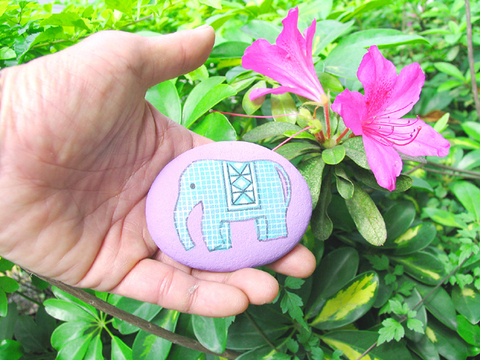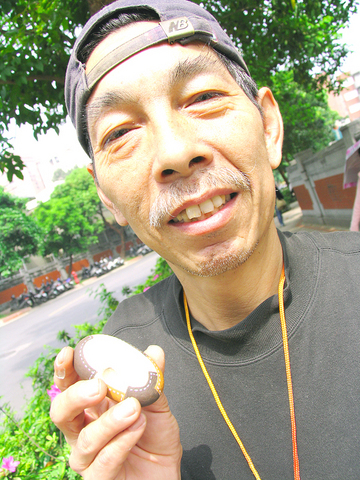He arrives on a bike, looks up at the sky and finds a place to lay down his mat. He then spreads out an assortment of colored stones and waits like a fisherman for a bite.
Locals and tourists wander past, glance at the collection, do a double take and often walk back to have a closer look, attracted by the lure of the brightly painted stones.
Wandering artist Wu Rong-bi (

PHOTOS: JULES QUARTLY, TAIPEI TIMES
He tells them that he finds the stones in Keelung, where there is a plentiful source of the flattened circular pebbles (about 3cm to 5cm in diameter) he prefers.
He says that some of the stones' designs are inspired by dreams, or are the product of his calligraphy studies. He uses bright acrylic paints. Some of them have African or Asian geometric patterns, others are figurative, with simplified forms such as an elephant or a leaf.
"Most paintings only have one plane or face," he says, "But these stones are three-dimensional art and are therefore that much more special."

Wu has been a Taipei City Government approved artist since last year, when he was given a pass that he hangs around his neck. It allows him to sell his wares on the street, in the Shida area off Hoping East Road most afternoons, or outside the Eslite store on Dunhua South Road in the evenings.
He teaches social studies to kids part time but his main income is from selling the stones, which retail from NT$300 to NT$200. He gives bonafide students 50 percent discount.
Erica Chen, a student from Texas, thought the stones were "pretty interesting. ... They're good value and great souvenirs that I can give friends when I get back home."

The Democratic Progressive Party (DPP), Chinese Nationalist Party (KMT), and the country’s other political groups dare not offend religious groups, says Chen Lih-ming (陳立民), founder of the Taiwan Anti-Religion Alliance (台灣反宗教者聯盟). “It’s the same in other democracies, of course, but because political struggles in Taiwan are extraordinarily fierce, you’ll see candidates visiting several temples each day ahead of elections. That adds impetus to religion here,” says the retired college lecturer. In Japan’s most recent election, the Liberal Democratic Party lost many votes because of its ties to the Unification Church (“the Moonies”). Chen contrasts the progress made by anti-religion movements in

Taiwan doesn’t have a lot of railways, but its network has plenty of history. The government-owned entity that last year became the Taiwan Railway Corp (TRC) has been operating trains since 1891. During the 1895-1945 period of Japanese rule, the colonial government made huge investments in rail infrastructure. The northern port city of Keelung was connected to Kaohsiung in the south. New lines appeared in Pingtung, Yilan and the Hualien-Taitung region. Railway enthusiasts exploring Taiwan will find plenty to amuse themselves. Taipei will soon gain its second rail-themed museum. Elsewhere there’s a number of endearing branch lines and rolling-stock collections, some

Could Taiwan’s democracy be at risk? There is a lot of apocalyptic commentary right now suggesting that this is the case, but it is always a conspiracy by the other guys — our side is firmly on the side of protecting democracy and always has been, unlike them! The situation is nowhere near that bleak — yet. The concern is that the power struggle between the opposition Chinese Nationalist Party (KMT) and their now effectively pan-blue allies the Taiwan People’s Party (TPP) and the ruling Democratic Progressive Party (DPP) intensifies to the point where democratic functions start to break down. Both

This was not supposed to be an election year. The local media is billing it as the “2025 great recall era” (2025大罷免時代) or the “2025 great recall wave” (2025大罷免潮), with many now just shortening it to “great recall.” As of this writing the number of campaigns that have submitted the requisite one percent of eligible voters signatures in legislative districts is 51 — 35 targeting Chinese Nationalist Party (KMT) caucus lawmakers and 16 targeting Democratic Progressive Party (DPP) lawmakers. The pan-green side has more as they started earlier. Many recall campaigns are billing themselves as “Winter Bluebirds” after the “Bluebird Action”